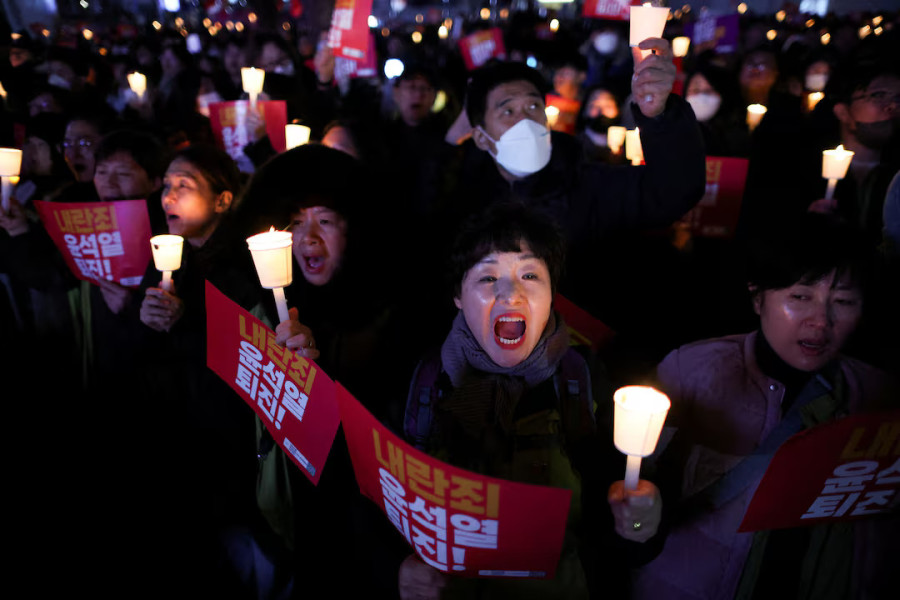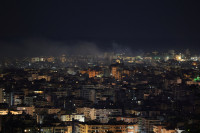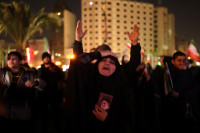World
South Korean president faces impeachment after martial law debacle
The leader of the president’s ruling People Power Party called for Defence Minister Kim Yong-hyun to be fired and the entire cabinet to resign.
Reuters
South Korean lawmakers submitted a bill on Wednesday to impeach President Yoon Suk Yeol after he declared martial law in the country, a major US ally, before rescinding the decision hours later after a chaotic standoff between parliament and the army.
Parliament rejected Yoon’s surprise declaration of martial law, which attempted to ban political activity and censor the media in Asia’s fourth-largest economy, as armed troops forced their way into the National Assembly building in Seoul.
Six South Korean opposition parties later submitted a bill in parliament to impeach Yoon, who had already faced accusations of heavy-handed leadership from his opponents and from within his own party, with voting set for Friday or Saturday.
A plenary session to formally introduce the bill was scheduled to begin shortly after midnight (1500 GMT) on Wednesday.
“We couldn’t ignore the illegal martial law,” DP lawmaker Kim Yong-min told reporters. “We can no longer let democracy collapse.”
Civic and labour groups held a candlelight vigil in downtown Seoul on Wednesday evening, calling for Yoon’s resignation- a reminder of the massive candlelight protests that led to the impeachment of former President Park Geun-hye in 2017. They then began marching towards the presidential office.
The leader of Yoon’s ruling People Power Party called for Defence Minister Kim Yong-hyun to be fired and the entire cabinet to resign. Kim has offered to resign, the defence ministry said.
Yoon told the nation in a television speech late on Tuesday that martial law was needed to defend the country from pro-North Korean anti-state forces and protect the free constitutional order, although he cited no specific threats.
Troops tried to seize control of the parliament building but stood back when parliamentary aides sprayed them with fire extinguishers, while protesters scuffled with police outside.
Within hours of the declaration, South Korea’s parliament, with 190 of its 300 members present, unanimously passed a motion for martial law to be lifted, with 18 members of Yoon’s party present.
The president then rescinded the declaration of martial law, around six hours after its proclamation.
Protesters outside the National Assembly shouted and clapped. “We won!” they chanted, and one demonstrator banged on a drum.
“There are opinions that it was too much to go to emergency martial law, and that we did not follow the procedures for emergency martial law, but it was done strictly within the constitutional framework,” a South Korean presidential official told Reuters by telephone.
There has been no reaction yet from North Korea to the drama in the South.
Yoon was embraced by leaders in the West as a partner in the US-led effort to unify democracies against growing authoritarianism in China, Russia and elsewhere.
But he caused unease among South Koreans by branding his critics as “communist totalitarian and anti-state forces” as his approval ratings slipped. In November, he denied wrongdoing in response to influence-peddling allegations against him and his wife and he has taken a hard line against labour unions.
Markets Volatile
Seoul appeared largely normal on Wednesday, with the usual rush hour traffic in trains and on the streets.
But Hyundai Motor’s (005380.KS)labour union announced plans to stage strikes on Thursday and Friday and some major employers, including Naver Corp (035420.KS), opens new tab and LG Electronics Inc (066570.KS), advised employees to work from home.
South Korean stocks (.KS11), opens new tab fell about 1.3 percent while the won was stable but close to a two-year low with dealers reporting suspected intervention by South Korean authorities.
Finance Minister Choi Sang-mok and Bank of Korea Governor Rhee Chang-yong held emergency meetings overnight and the finance ministry promised to prop up markets if needed.
“We will inject unlimited liquidity into stocks, bonds, short-term money market as well as forex market for the time being until they are fully normalised,” a government statement said.
Sales of canned goods, instant noodles and bottled water had soared overnight, said a major South Korean convenience store chain, which sought anonymity.
“I’m deeply disturbed by this kind of situation, and I’m very concerned about the future of the country,” 39-year-old Seoul resident Kim Byeong-in told Reuters.
The National Assembly can impeach the president if more than two-thirds of lawmakers vote in favour. A trial by the constitutional court follows, which can confirm the motion with a vote by six of the nine justices.
Yoon’s party has 108 seats in the 300-member legislature.
‘Dodged a Bullet’
If Yoon resigned or was removed from office, Prime Minister Han Duck-soo would fill in as leader until a new election was held within 60 days.
“South Korea as a nation dodged a bullet, but President Yoon may have shot himself in the foot,” Danny Russel, vice president of the Asia Society Policy Institute think tank in the United States, said of the first martial law declaration in South Korea since 1980.
US Secretary of State Antony Blinken said he welcomed Yoon's decision to rescind the martial law declaration.
“We continue to expect political disagreements to be resolved peacefully and in accordance with the rule of law,” Blinken said in a statement.
South Korea hosts about 28,500 American troops as a legacy of the 1950-1953 Korean War.
Planned defence talks and a joint military exercise between the two allies were postponed amid the broader diplomatic fallout from the overnight turmoil.
South Korea’s political situation is an “internal matter” for the country, China’s Foreign Minister Wang Yi told reporters.
Russia said it was following the “tragic” events in South Korea with concern.
Yoon, a career prosecutor, squeezed out a victory in the tightest presidential election in South Korean history in 2022, riding a wave of discontent over economic policy, scandals and gender wars.
But he has been unpopular, with his support ratings hovering at around 20 percent for months and the opposition captured nearly two-thirds of seats in parliament in an election in April.
Martial law has been declared more than a dozen times since South Korea was established as a republic in 1948. In 1980, a group of military officers forced then-President Choi Kyu-hah to proclaim martial law to crush calls for the restoration of democratic government.




 14.24°C Kathmandu
14.24°C Kathmandu














